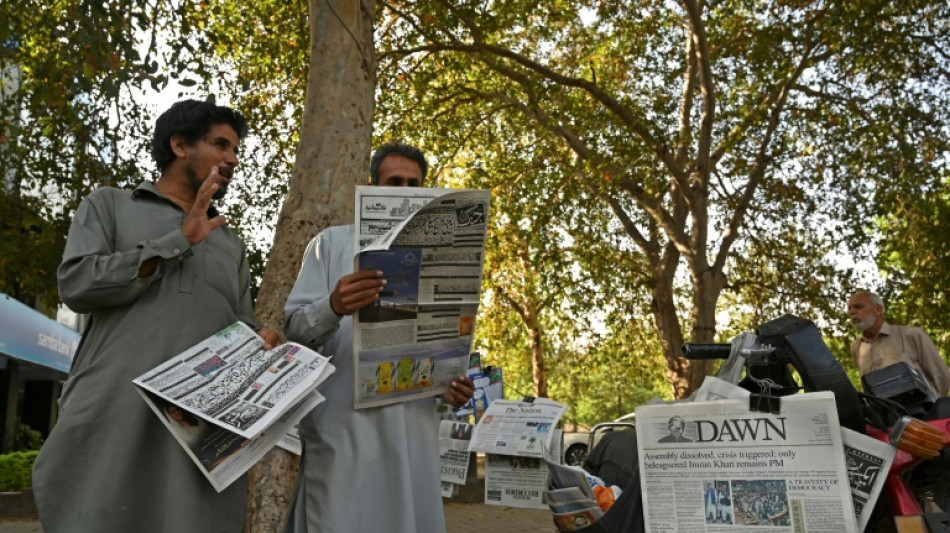
-
 England dig in as they chase a record 435 to keep Ashes alive
England dig in as they chase a record 435 to keep Ashes alive
-
Wembanyama 26-point bench cameo takes Spurs to Hawks win

-
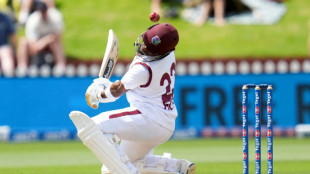 Hodge edges towards century as West Indies 310-4, trail by 265
Hodge edges towards century as West Indies 310-4, trail by 265
-
US Afghans in limbo after Washington soldier attack

-
 England lose Duckett in chase of record 435 to keep Ashes alive
England lose Duckett in chase of record 435 to keep Ashes alive
-
Australia all out for 349, set England 435 to win 3rd Ashes Test

-
 US strikes over 70 IS targets in Syria after attack on troops
US strikes over 70 IS targets in Syria after attack on troops
-
Australian lifeguards fall silent for Bondi Beach victims

-
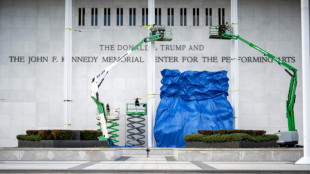 Trump's name added to Kennedy Center facade, a day after change
Trump's name added to Kennedy Center facade, a day after change
-
West Indies 206-2, trail by 369, after Duffy's double strike

-
 US strikes Islamic State group in Syria after deadly attack on troops
US strikes Islamic State group in Syria after deadly attack on troops
-
Epstein files opened: famous faces, many blacked-out pages
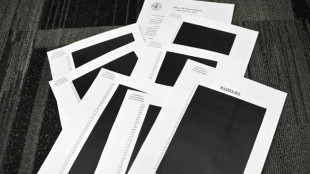
-
 Ravens face 'special' Patriots clash as playoffs come into focus
Ravens face 'special' Patriots clash as playoffs come into focus
-
Newly released Epstein files: what we know

-
 Musk wins US court appeal of $56 bn Tesla pay package
Musk wins US court appeal of $56 bn Tesla pay package
-
US judge voids murder conviction in Jam Master Jay killing

-
 Trump doesn't rule out war with Venezuela
Trump doesn't rule out war with Venezuela
-
Haller, Aouar out of AFCON, Zambia coach drama

-
 Nasdaq rallies again while yen falls despite BOJ rate hike
Nasdaq rallies again while yen falls despite BOJ rate hike
-
Bologna win shoot-out with Inter to reach Italian Super Cup final

-
 Brandt and Beier send Dortmund second in Bundesliga
Brandt and Beier send Dortmund second in Bundesliga
-
Trump administration begins release of Epstein files

-
 UN Security Council votes to extend DR Congo mission by one year
UN Security Council votes to extend DR Congo mission by one year
-
Family of Angels pitcher, club settle case over 2019 death

-
 US university killer's mystery motive sought after suicide
US university killer's mystery motive sought after suicide
-
Rubio says won't force deal on Ukraine as Europeans join Miami talks

-
 Burkinabe teen behind viral French 'coup' video has no regrets
Burkinabe teen behind viral French 'coup' video has no regrets
-
Brazil court rejects new Bolsonaro appeal against coup conviction

-
 Three-time Grand Slam winner Wawrinka to retire in 2026
Three-time Grand Slam winner Wawrinka to retire in 2026
-
Man Utd can fight for Premier League title in next few years: Amorim

-
 Pandya blitz powers India to T20 series win over South Africa
Pandya blitz powers India to T20 series win over South Africa
-
Misinformation complicated Brown University shooting probe: police

-
 IMF approves $206 mn aid to Sri Lanka after Cyclone Ditwah
IMF approves $206 mn aid to Sri Lanka after Cyclone Ditwah
-
US halts green card lottery after MIT professor, Brown University killings
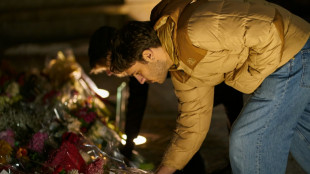
-
 Stocks advance as markets cheer weak inflation
Stocks advance as markets cheer weak inflation
-
Emery says rising expectations driving red-hot Villa

-
 Three killed in Taipei metro attacks, suspect dead
Three killed in Taipei metro attacks, suspect dead
-
Seven Colombian soldiers killed in guerrilla attack: army

-
 Amorim takes aim at Man Utd youth stars over 'entitlement'
Amorim takes aim at Man Utd youth stars over 'entitlement'
-
Mercosur meets in Brazil, EU eyes January 12 trade deal

-
 US Fed official says no urgency to cut rates, flags distorted data
US Fed official says no urgency to cut rates, flags distorted data
-
Rome to charge visitors for access to Trevi Fountain

-
 Spurs 'not a quick fix' for under-fire Frank
Spurs 'not a quick fix' for under-fire Frank
-
Poland president accuses Ukraine of not appreciating war support

-
 Stocks advance with focus on central banks, tech
Stocks advance with focus on central banks, tech
-
Amorim unfazed by 'Free Mainoo' T-shirt ahead of Villa clash

-
 PSG penalty hero Safonov ended Intercontinental win with broken hand
PSG penalty hero Safonov ended Intercontinental win with broken hand
-
French court rejects Shein suspension

-
 'It's so much fun,' says Vonn as she milks her comeback
'It's so much fun,' says Vonn as she milks her comeback
-
Moscow intent on pressing on in Ukraine: Putin


Pakistan's top court adjourns as constitutional crisis rages
Pakistan's Supreme Court adjourned Monday without ruling on Prime Minister Imran Khan's shock decision to dissolve parliament and call a snap election, sidestepping a no-confidence vote that would have seen him booted from office.
The court, which will sit again Tuesday, received a slew of suits and petitions from the government and opposition after the deputy speaker of the national assembly refused Sunday to allow debate on a no-confidence motion against Khan's administration.
Simultaneously, Khan asked the presidency -- a largely ceremonial office held by a loyalist -- to dissolve the assembly, meaning an election must be held within 90 days.
According to the constitution, the prime minister cannot ask for the assembly to be dissolved while he is facing a no-confidence vote.
Farooq Naek, a lawyer representing petitioners seeking to overturn the assembly dissolution, told the supreme court it wasn't in the "power and ambit" of the deputy speaker to reject the no-confidence motion.
"It was a constitutional irregularity coupled with 'mala fide'," he said, a legal term meaning "bad faith".
The opposition had expected to take power on Sunday after mustering enough votes to oust Khan, but the deputy speaker -- a member of the cricketer-turned-politician's party -- refused to allow the motion to proceed because of alleged "foreign interference".
An alliance of usually feuding dynastic parties had plotted for weeks to unravel the tenuous coalition that made Khan premier in 2018, but he claimed they went too far by colluding with the United States for "regime change".
- Washington denial -
Khan insists he has evidence -- which he has declined to disclose publicly -- of Washington's involvement, although local media have reported it was merely a briefing letter from Pakistan's ambassador following a meeting with a senior US official.
Western powers want him removed because he won't stand with them on global issues against Russia and China, Khan said.
Washington has denied involvement.
On paper, and pending any court decision, Khan will remain in charge until an interim government is formed to oversee elections.
A notice Monday from President Arif Alvi to Khan and opposition leader Shehbaz Sharif said they should agree on a new interim prime minister, but Sharif declined to cooperate.
"How can we respond to a letter written by a person who has abrogated the constitution?" he told a press conference Monday.
Fawad Chaudhry, information minister in the outgoing cabinet, tweeted that Khan had proposed former chief justice Gulzar Ahmad for the role.
- 'Constitutional crisis' -
Khan appeared to have wrong-footed the opposition with his weekend manouvres.
"Khan's 'surprise' triggers constitutional crisis," thundered The Nation newspaper Monday, while its rival Dawn called it "A travesty of democracy" above a front-page editorial.
The supreme court is ostensibly independent, but rights activists say previous benches have been used by civilian and military administrations to do their bidding throughout Pakistan's history.
It is unclear when the court may rule on the issue -- or if Khan would even accept its decision -- but there is precedent.
In 1988 Muhammad Khan Junejo appealed to the Supreme Court after the assembly was dissolved by President General Zia-ul-Haq, who had taken power in a military coup years earlier.
The court agreed his government had been dissolved unconstitutionally, but ruled that since elections had been announced anyway it was best to move on.
Khan was elected after promising to sweep away decades of entrenched corruption and cronyism, but has struggled to maintain support with inflation skyrocketing, a feeble rupee and crippling debt.
Some analysts said Khan had also lost the crucial support of the military, but it is unlikely he would have pulled off Sunday's manoeuvres without its knowledge -- if not blessing.
There have been four military coups -- and at least as many unsuccessful ones -- since independence in 1947, and the country has spent more than three decades under army rule.
"The best option in this situation are fresh elections to enable the new government to handle economic, political and external problems faced by the country," said Talat Masood, a general-turned-political analyst.
As the opposition scrambled to react, Khan taunted them on Twitter.
"So why the fear of elections now?"
T.Bondarenko--BTB
